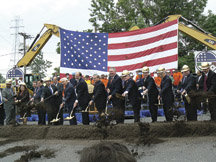The future of the nation’s largest transportation project, with the most federal funds ever, could be decided before this week is over.
Less than 24 hours after announcing the $8.7 billion Trans-Hudson Express Tunnel was to be cancelled, Gov. Christopher Christie backed off and announced a two-week reprieve before scheduling a final decision by Oct. 22.
The project, also known as Access to the Regions Core (ARC) was in the making for almost 20 years. It is being operated by NJ Transit, which last month announced a 30-day freeze based on Christie’s insistence that spending on the project had to be investigated. The governor fears the project could go over-budget, to a total of as much as $14 billion, and has said that New Jersey has no funds to foot the bill.
Christie cancelled the project on Oct. 7, which caused many officials, including U.S. Senators Frank Lautenberg and Robert Menendez (both D-N.J.), to attack his decision.
“What a waste it would be to leave a $600 million hole in the ground.” – Charles Wowkanech
________
Then on Friday the Hudson Reporter learned from Menendez that Christie had canceled the project before a planned meeting with U.S. Secretary of Transportation Ray LaHood and Federal Transit Administrator Peter Rogoff, scheduled that day in order to talk about financial solutions.
LaHood confirmed this week that the meeting eventually did occur despite the governor’s announcement.
“Governor Christie and I had a good discussion, during which I presented a number of options for continuing the ARC tunnel project,” he said. “We agreed to put together a small working group from the U.S. Department of Transportation and the office of NJ Transit Executive Director Jim Weinstein that will review these options and provide a report to Governor Christie within two weeks.”
North Bergen Mayor and state Sen. Nicholas Sacco (D-Hudson) said that while watching Christie on television after the meeting, he looked “physically shaken.”
“He’s fighting with the teacher’s union,” said Sacco during the public session of North Bergen’s Commissioners meeting. “Now he’s fighting with the federal government. He’s losing that one pretty badly.”
A request for comment to Christie’s office was not returned in time for publication.
Jobs at stake
The tunnel was originally slated to be complete in 2018, and according to NJ Transit, would double the number of trains traveling between New Jersey and New York from its current 23 per hour to 48.
It was also suppose to create 6,000 construction jobs and more than 44,000 permanent jobs.
“This will move people all over the state into New York efficiently without coming into the roads of Hudson County,” said Sacco. “This is a long-range project. A lot of people can’t see it because you’re talking 10 years down the road or more.
Sacco said that it could create an “economic boom,” but that without it, New Jersey’s transportation system will remain the same, which would mean “disaster.”
The American Federation of Labor and Congress of Industrial Organizations (AFL-CLO) President Charles Wowkanech asked Christie to work with federal officials for the best interest of the project, which he said everyone needed.
“With unemployment rates still above 9.5 percent and even higher in the building trades, we cannot afford to lose the 6,000 construction jobs and 45,000 permanent jobs this project represents,” said Wowkanech. “We cannot afford to give back a $3 billion federal grant that would be gobbled up in a minute by other states. We’ve already spent $600 million on this project. What a waste it would be to leave a $600 million hole in the ground.”
Finding funding
On Thursday, Lautenberg was scheduled to announce his new study on the project. According to published reports, he has also been contacted by a New York City-based finance firm to explore financing options.
To date, the FTA has promised $3 billion, the largest given to any transportation project in history, while the Port Authority has agreed to $3 billion, leaving New Jersey with the $2.7 billion remaining.
However, if the project is cancelled New Jersey will owe the federal government the $300 million they have already spend on the project.
“Where are we going to get that money?” asked Sacco. “[It is going] to create another phenomenal hole in the [state] budget.”
Menendez said that it was unlikely that more federal funding could be put in place since they had already secured the largest federal contribution in history. Lautenberg said that “redirecting” the funds to other projects was not an option since none of them are eligible. He also denied that the funds could be transferred into the state’s Transportation Trust Fund.
“Gov. Christie clearly doesn’t get it – the money that would have gone to ARC will now be headed to Houston or Orlando or another city with an approved, shovel-ready project. It could take New Jersey another 30 to 40 years, and a much higher price tag, to recover from the loss of the ARC Tunnel,” said Lautenberg.
Wowkanech said that the fund was created under Democratic and Republican leaders, a good example of the bipartisan work needed in order to save the tunnel.
“I know there has been a lot of talk about whether money from the tunnel project could be used to pay for new projects under the Transportation Trust Fund,” he said. “But New Jersey needs to do both. We need to build the tunnel and we need to find a way to put money back into the Transportation Trust Fund. These are two separate issues.”
Tricia Tirella may be reached at TriciaT@hudsonreporter.com.
